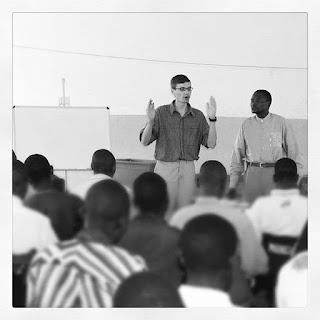What's James 3:1 got to do with it?
 |
| A bit of teaching in Malawi. |
Now, I'm glad about how seriously people around me take Scriptures like this. My question, however, is why didn't anyone give me this verse before? Why does James 3:1 suddenly kick in in our thinking after someone has been recognised as a teacher, but not beforehand, when they're doing a lot of teaching without the recognition of that call?
You see, teaching is something very important to the Christian faith. Our faith is based on 'the faith', the teaching which we have received. Any time we share the gospel with someone, telling them how Christ died for our sin and rose again, then we're teaching. So there's a lot of teaching that goes on within and around the Christian church.
That's why the way some people apply James 3:1 confuses me a bit. It almost seems like anyone can teach freely without much concern, but the teachers better watch out. Now, it's true that James does say that the teachers will 'receive a stricter judgement', but I'm not convinced that that's the whole point of what he's saying. In fact, I don't think this verse is really a warning to the teachers at all (although of course, at least that last part does apply to them). Rather, James is directing his attention to those who aren't teachers.
James is warning his readers about the seriousness of Christian teaching. Teaching is important, because teaching conveys the faith once delivered to the saints. Teaching is a matter of life and death, because through teaching the gospel is made known (e.g. Acts 5:42; Acts 13:12). So James wants to make sure his readers realise the seriousness of teaching. Teaching is necessary, but it's also very serious, and so it's not to be handled lightly. It's not a way of getting the new Christians involved in the life of the church (as has been suggested to me on so many occasions). Nor is it a matter of letting all the men in the assembly have their turn (as has sometimes, regrettably, been the case in the past). In fact, Martyn Lloyd-Jones said that if he were to be invited to speak by the Brethren, he would preach on James 3:1 for this very reason: teaching the assembly isn't something everyone can have a go at, but a serious matter for which God has called and equipped men whom He has gifted to the Church.
That's not to say that only teachers can teach. Far from it! The Scriptures make clear that all elders are to be 'apt to teach' (1 Tim. 3:2 - in fact this is the only substantial difference in the qualifications of elders and deacons) and this is part of the calling of all the ascension ministries. And there are many ways in which other Christians are involved in teaching the faith as well (which is particularly true of all Christian parents). But James wants us to recognise the seriousness of that call: whether as parent, elder, apostle or teacher, teaching is a serious matter with a stricter judgement.